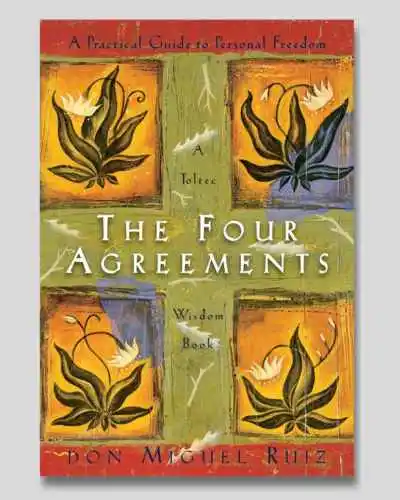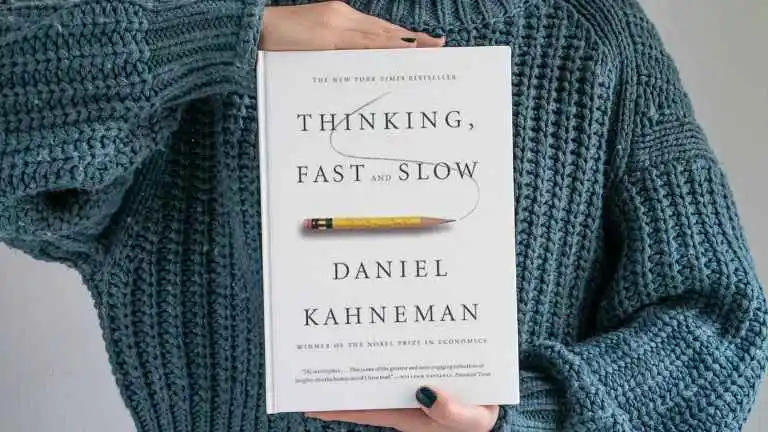The Four Agreements: A Practical Guide to Personal Freedom, written by Don Miguel Ruiz, is a transformational self-help book published in 1997.
Drawing from ancient Toltec wisdom, the book offers a blueprint for breaking self-limiting beliefs and attaining personal freedom. Ruiz presents four fundamental principles – The Four Agreements – that serve as a guide to a fulfilling and liberated life.
His approach is simple yet profound, emphasizing personal responsibility, mindfulness, and integrity.
With just 160 pages, this book has garnered immense popularity, becoming a timeless classic in the self-improvement genre.
The agreements Ruiz presents are deeply rooted in psychological, philosophical, and spiritual insights, making the book accessible to a broad audience seeking personal growth and emotional healing.
..
Deep Analysis of the Core Idea
The fundamental premise of The Four Agreements is that human suffering originates from self-imposed limitations and conditioned beliefs.
Ruiz argues that from childhood, individuals are subjected to a “domestication” process, where they unconsciously accept societal rules, expectations, and self-judgment.
These ingrained beliefs create an internal dialogue filled with fear, doubt, and self-restriction.
Ruiz presents a path to personal liberation through four guiding principles:
1. Be Impeccable with Your Word
This agreement emphasizes the immense power of language. Words have a creative force, shaping both self-perception and external relationships.
Speaking with integrity fosters trust, while negative speech, whether through gossip, self-criticism, or dishonesty, perpetuates toxicity. Ruiz explains that words function as spells; positive words elevate, while destructive ones inflict deep wounds.
This concept aligns with linguistic psychology, which highlights how language molds cognition and emotional well-being.
Moreover, internal dialogue plays a crucial role. Negative self-talk reinforces self-doubt, limiting potential, while positive affirmations promote confidence and resilience.
Thus, practicing impeccable speech—both internally and externally—becomes a foundation for mental clarity and personal growth.
2. Don’t Take Anything Personally
Ruiz dismantles the illusion of external validation, explaining that people’s actions and words reflect their internal struggles rather than an absolute truth about others. By internalizing this principle, individuals shield themselves from unnecessary emotional distress.
Taking things personally fuels insecurities, anchoring one’s self-worth in external opinions. Ruiz argues that detachment from such reactions fosters emotional independence.
This aligns with Stoic philosophy, which emphasizes controlling personal reactions rather than external circumstances.
Psychologically, this practice reduces anxiety and enhances resilience, enabling individuals to engage with criticism without emotional turmoil.
3. Don’t Make Assumptions
Human relationships often suffer due to miscommunication and unwarranted assumptions. Ruiz urges individuals to seek clarity rather than filling knowledge gaps with speculation. Assumptions lead to misunderstandings, fostering resentment and conflict.
In cognitive-behavioral therapy (CBT), challenging cognitive distortions – including assumption-making – is a core practice for mental well-being.
Clear communication, active listening, and questioning one’s interpretations reduce unnecessary emotional turbulence.
Ruiz advocates for direct questioning rather than interpreting situations through preconceived notions, leading to greater relationship harmony and self-awareness.
4. Always Do Your Best
Unlike perfectionism, which breeds anxiety and self-judgment, this agreement acknowledges the fluctuating nature of human capability.
One’s best effort varies based on circumstances, health, emotions, and experience influence output. However, sincere effort, regardless of outcome, cultivates self-acceptance and fulfillment.
Ruiz’s perspective aligns with self-compassion theory, which encourages individuals to approach effort with kindness rather than harsh judgment.
This mindset prevents burnout, fosters perseverance, and enhances long-term growth, whether applied to careers, personal development, or relationships.
..
The Collective Impact of The Four Agreements
When practiced consistently, these agreements act as a blueprint for mental liberation. They dismantle self-imposed constraints, encourage authenticity, and promote emotional stability.
The shift from fear-based reactions to conscious, empowered choices enhances well-being, reducing suffering caused by conditioned beliefs.
Ultimately, Ruiz’s framework is not about external change but internal mastery—redefining thought patterns, emotional responses, and self-perception.
The Four Agreements pave the way for personal freedom, not through rigid discipline, but through conscious, mindful living.
..
Applying These Learnings in Real Life
Breaking the Cycle of Negative Self-Talk
By being impeccable with words, individuals can reprogram self-perceptions, replacing self-criticism with affirmations that reinforce confidence and self-worth.
Self-awareness is key in identifying harmful internal narratives, and consciously choosing empowering words fosters a positive self-image.
Developing mindfulness around language, both spoken and internal, leads to stronger emotional stability and higher self-esteem.
Strengthening Emotional Resilience
Not taking things personally helps individuals maintain emotional stability in interpersonal relationships, avoiding unnecessary conflicts and insecurities.
This principle is especially relevant in professional environments, where constructive criticism is common.
Understanding that others’ words and actions stem from their own realities allows for detachment from emotional reactions, promoting mental resilience and self-assurance in challenging situations.
Enhancing Communication and Relationship Dynamics
Avoiding assumptions encourages direct communication, reducing misunderstandings and fostering stronger personal and professional relationships. In romantic relationships, assuming a partner’s thoughts or intentions often leads to conflict.
Practicing open, honest dialogue ensures clarity and trust. Similarly, in the workplace, clear communication eliminates inefficiencies, enhances teamwork, and prevents unnecessary tension.
Maximizing Productivity Without Burnout
Doing one’s best allows individuals to balance ambition with self-care, fostering sustainable personal and professional growth.
Unlike rigid perfectionism, this principle cultivates intrinsic motivation. Recognizing that “best” varies based on circumstances encourages individuals to push forward without self-judgment.
This mindset is essential for long-term success, preventing emotional exhaustion while maintaining high performance and personal fulfillment.
Overcoming Fear and Living Authentically
Applying all four agreements collectively leads to a life of greater authenticity. Fear of judgment or failure often holds individuals back from pursuing dreams.
By aligning actions with personal values rather than societal expectations, individuals achieve inner peace and confidence.
This transformation enables a more fulfilling life, rooted in purpose and self-awareness.
..
Similar Concepts and Comparisons
Ruiz’s philosophy shares similarities with Buddhist mindfulness, Stoic philosophy, and cognitive-behavioral therapy.
- Buddhism advocates detachment from ego-driven reactions, much like not taking things personally.
- Stoicism emphasizes controlling perceptions, similar to avoiding assumptions.
- Cognitive-behavioral therapy (CBT) focuses on reshaping negative thought patterns, aligning with the principle of impeccable speech.
Compared to books like The Power of Now by Eckhart Tolle, The Four Agreements is more structured and practical.
While Tolle emphasizes spiritual presence, Ruiz provides actionable steps toward self-mastery.
..
Contemporary Relevance
In an age of digital noise and social media influence, The Four Agreements is more relevant than ever. Many people struggle with validation-seeking behavior and emotional turmoil caused by online interactions.
Practicing these agreements fosters emotional independence, reducing anxiety caused by external opinions and judgments.
Additionally, in professional settings, effective communication, emotional resilience, and productivity principles derived from Ruiz’s teachings are crucial for leadership and teamwork.
..
Conclusion and Recommendation
Ruiz’s insights serve as a practical guide for anyone seeking personal transformation. The book’s clarity, actionable principles, and philosophical depth make it a valuable read for those looking to break free from limiting beliefs and enhance their quality of life. Its universal wisdom ensures relevance across cultures and generations.

- Title: The Four Agreements: A Practical Guide to Personal Freedom
- Author: Don Miguel Ruiz
- Publication Year: 1997
- Publisher: Amber-Allen Publishing
- Pages: 160
- Genre: Self-help, Personal Development, Spirituality
..
Why You Should Read The Four Agreements
If you seek personal growth, emotional resilience, and improved relationships, The Four Agreements is an essential read. Ruiz’s principles provide a powerful yet simple roadmap to self-mastery and inner peace. Implementing these agreements can profoundly transform how you navigate life, fostering authenticity, confidence, and a sense of personal freedom.
..
..

Andrea Moura
Literary Critic and Columnist for the Book Review Blog



